16 minutes
On Bullshit
Why Thinking Matters

“Never tell a lie when you can bullshit your way through” says Arthur Abdel Simpson, recounting advice received from his father in Eric Ambler’s novel Dirty Story.
The author of this article received a similar canard in his youth when a well-meaning adult would channel W.C. Fields by advising “if you can’t dazzle them with your brilliance, baffle them with your bullshit.”
The majority of readers will recognise the animus behind both these bromides yet for the vast majority of us, BS is a quantity we’re unlikely to be able to easily articulate conceptually. Yet its prevalence in society appears to be on the upswing — to the point where Harry Frankfurt (more on him shortly) opens one of his most famous tongue-in-cheek essays with the line “One of the most salient features in our culture is that there is so much bullshit”.
Why are many of us so convinced regarding our ability to both recognise BS and avoid being taken in by it, when most of us couldn’t succinctly articulate what it actually is? A quick counter could be to call up the US Supreme Court matter of Nico Jacobellis v. Ohio (1964). Regarding the definition of “hardcore pornography” Justice Potter Stewart famously opined “I could never succeed in intelligibly doing that [defining it]. But I know it when I see it.”
Be that as it may, the aforementioned professor emeritus of philosophy at Princeton, Harry Frankfurt, had the first real take at defining what BS is and disambiguated it from the prevailing idea that it lay on the same continuum as truth and lies. In fact, Frankfurt argues — successfully in the author’s opinion — that although the antithesis of Truth is Lies, Bullshit cares not for Truth or Lies at all but rather is useful only insofar as the bullshitter is able to use their words to further a particular goal. They may or may not care at all for the truth/falsehood of a particular statement, all they care about is that their ends are furthered.

The philosophical treatment of the nature of BS is explored in his essay On Bullshit. What’s striking is its prescience and applicability to the present day; one need not look much further than the 2016 word of the year, namely: Post-Truth. The relentless media fact-checking onslaught during the US Elections and daily exposure of inaccuracies, equivocations and outright lies had almost no effect on Trump’s ultimate rise to the highest office in the most powerful nation on earth. His relationship with truth during the election campaign (and apparently also in his putative first few weeks in office) was at best tenuous. Yet given our new appreciation for the nature of BS, it almost didn’t matter.

All Trump, Bannon, Spicer and Conway cared about was the effectiveness of their rhetoric, irrespective of the truth-value of their words. In one of the hallmarks of unadulterated BS, they may or may not have known whether or not they were misrepresenting facts (again evidenced by Mrs Conway coining the very 2017 term “alternative facts”). What the actual facts are never mattered and this represents a peculiar and quite particular 21st century danger.
A decade ago the author would use the website Snopes.com to help verify everything from viral email content (you will win a laptop if you forward this to your whole address book) and claims from online articles to various urban myths one periodically hears at dinner parties or tipple-lubricated gatherings. Now more than ever however, services like these appear as crucial as safety belts and turn-indicators on vehicles.
Given we now know what Bullshit is not, we can continue to explore what it is while asking why it seems we struggle so much in the present day to discern what’s real versus what’s unreal, why this trend is set to continue and also explore the implications of this before looking at how we can protect ourselves going forward.
This idea of arming ourselves with tools designed to protect us from the ever-present BS in our world is one of the animating principles behind a fledgling international organisation called The Macro Forum which I’ve recently become affiliated with and will again mention further on.
Let’s Unpack
Each year a new spate of business and managerial acronyms traipse across the zeitgeist into popular lexicon and for our purposes we’ll borrow a 2014 variant, VUCA. This stands for volatility, uncertainty, complexity & ambiguity and it’s been used to describe the increasingly uncertain and non-linear properties of modern organisations as well as the environments within which they operate.
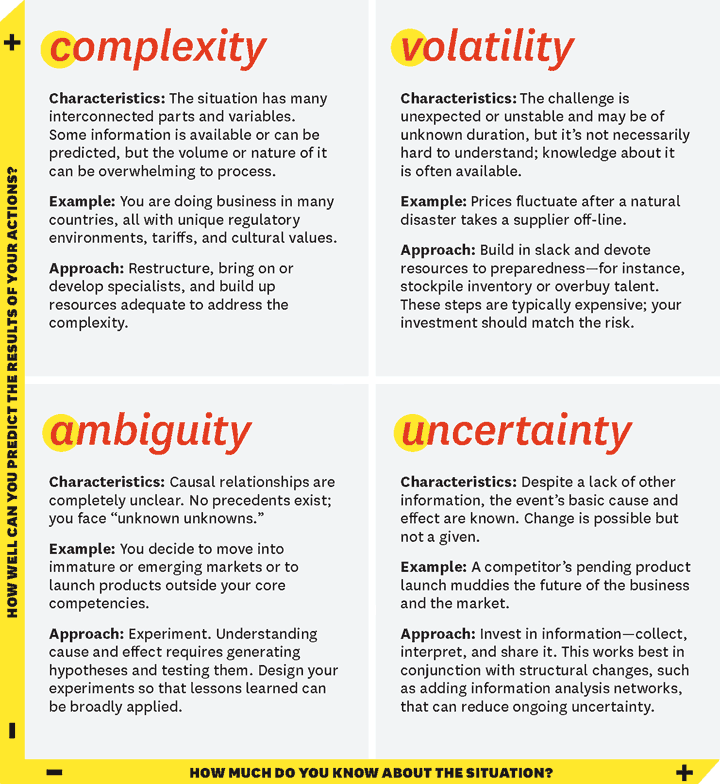
We are living in decidedly high VUCA times and during periods like this many people are looking for answers and meaning to read the tea-leaves of current events. These may be Remainers who saw Brexiteers walking away with the grand prize, or Liberals who witnessed the Democratic party lose the Senate, House and Presidency to the Republicans and Trump respectively. Those casting a wary eye towards Le Pen & Wilders as well as general geopolitical and socioeconomic machinations are also acutely aware of the volatile and uncertain nature of things today.
On the subject of Trump & Farage though, it should be noted how the Leave campaign also sacrificed truth at the altar of rhetorical effectiveness and this phenomenon actually points to far more substantive underlying mechanics ala the hidden part of the iceberg more than the ol’ Jedi wave of the hand.
But why?
The question of why we are so consistently primed to fall for BS and rhetoric is an important one although one whose answers likely require a far fuller treatment than that which will be alluded to here — and further exploration of some of these concepts will certainly occur in future articles.
Be that as it may the “problem” appears to exist in three domains which can all have a self-reinforcing property that has culminated in the perfect tempest we find ourselves in.
Xinyuan aka Monkey Mind
That humans are ruled by their passions is knowledge we’ve had from time immemorial. Just under two millennia ago Epictetus would issue his warning to “control thy passions lest they take vengeance” on us. Yet it was not until Daniel Kahneman and Amos Tversky expanded their theories in the 1970s on which Behavioural Economics & Finance are based — that we got a good handle on the mechanisms driving this behaviour and an expectation of humanity’s propensity to be predictably irrational as expounded by psychologist Dan Ariely.
What we are of course talking about here (by way of analogy) is the classic Elephant (System 1) and Rider (System 2) problem, although Kahneman & Tversky go further in their analysis. The rational, conscious, thinking part of your brain is the rider on top of an elephant — it takes decisions, thinks critically and plans for the future. The elephant represents the visceral more automatic and largely emotional part of ourselves. The rider has intentionality and will try to direct the elephant along a particular path but ultimately it is the elephant that does the moving. If distracted it will wander off the rider’s carefully considered path, tearing after whatever stimulus has gotten its attention.
Advertisers, Marketers, Magicians, Pick Up Artists, Master Salespeople etc. have long understood how to circumnavigate the rider and commune directly with the elephant to awesome effect. So too have those who engage in rhetoric, propaganda and BS-politik. What we learned with the research into behaviour is also how cognitively taxing engaging the rider’s faculties is — thinking, in a biological sense, is expensive. So we tend to default to just riding along with the whims of the elephant because it requires far less effort than critical engagement. In other words, thinking is hard.
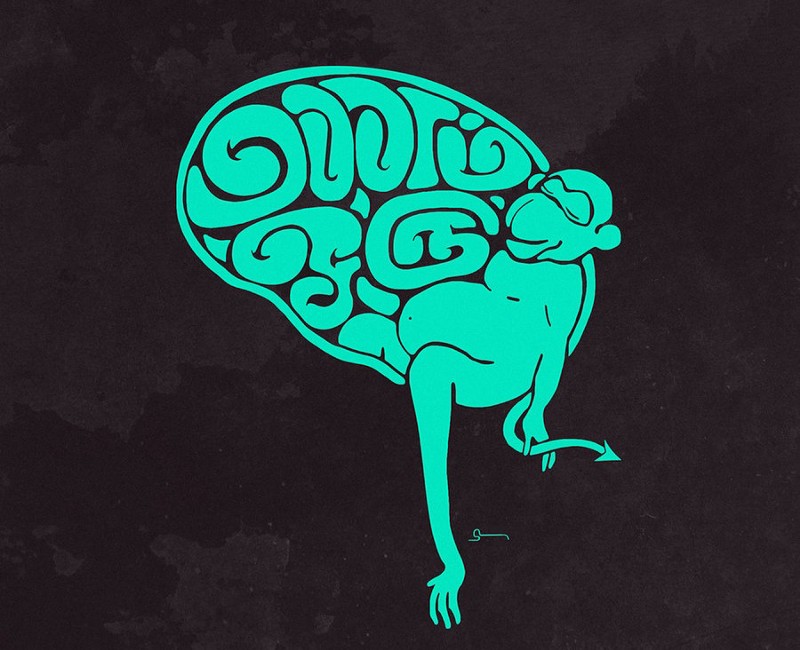
Filter/Information Bubbles
Another fascinating development has been the effect of the extreme proliferation of information which we are living through — to the point we’ve dubbed the present day the Information Age. The outsized effect of the invention and mass production of Gutenberg’s printing press in the 15th century cannot be overstated with particularly European history and development taking a major turn within the spheres of politics, science, religion, commerce and culture. Yet the dawn of the information age has dwarfed those advancements in a fraction of the time and the idealists and utopians saw the dawn of a new age of enlightenment — with all and sundry having access to the wealth of all of humanity’s knowledge leading to a veritable nirvana. This “democratisation of information” argument now appears quixotic at best.
Instead what we’ve found is that the level of real engagement has in recent times had an inverse relationship with the amount of information available for consumption. More and more we’ve tended to find ourselves in filter bubbles tailored to our specific interests. There is now more information than ever to reinforce almost any point of view — from flat earth theories to holocaust denialism. It’s now, more than ever before, possible to exist in a mutually reinforcing echo chamber — one which parses all the information it receives and ensures that it is only ever presented in a way which buttresses previously held notions.
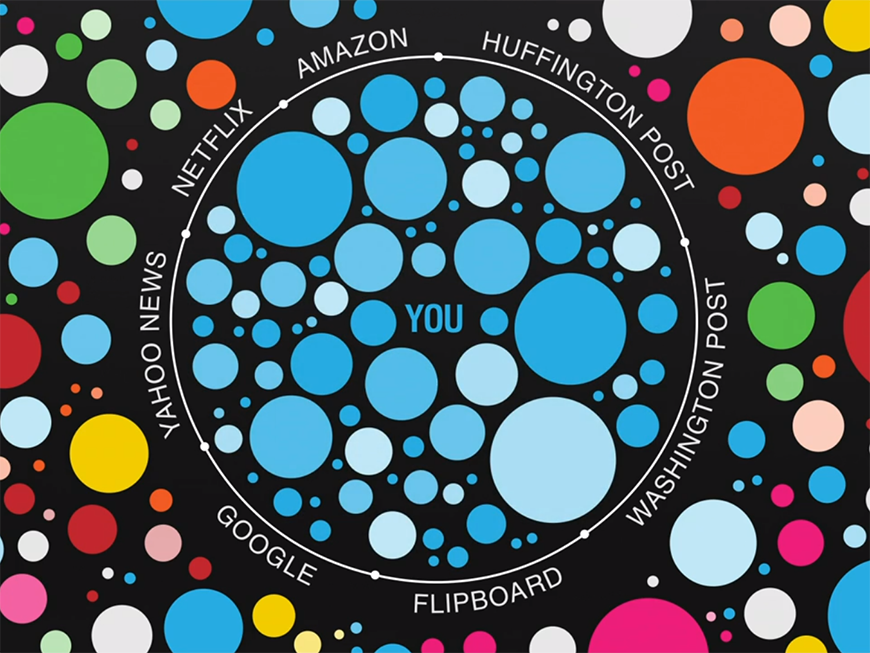
Of course a modern classic of the genre is the current US Democrat/Left and Republican/Right divide. In the past there would often be large areas of overlap between each of the two bubbles in the Venn Diagram — which resulted in having common language for dialogue and opportunity for compromise.
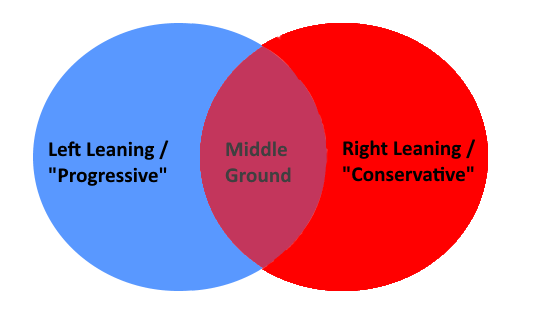
Recently these bubbles have drifted apart to the point of having no common area while having a fully vertically-integrated information-delivery stack serving them (e.g. CNN, The Guardian, The Economist, WasPo, NYT etc. serving the Left. Fox, Breitbart, Drudge Report, Bill O’Reilly, National Review etc. serving the Right). With substantial parts of our existence largely having migrated online we’re also far more vulnerable to the algorithms powering Facebook, Twitter, YouTube, Amazon, Netflix and of course Google. These algorithms nudge us further and further into filter bubbles to the point where two users watching the same video on FB or consuming the same content — can come away with vastly different interpretations of what happened based on which filter bubble they happen to inhabit at that particular time.
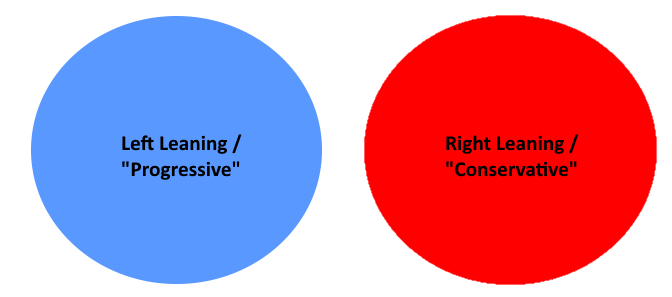
The point though is that the proliferation of information has not led to an easier time of discerning truth or more plurality but rather it has been a naked flame applied to the lighter fluid of our confirmation bias. This situation can be exploited by those adept at manipulating the inputs into these filter bubbles as the resultant echo chambers amplify the messaging accordingly.
Memes
Lastly, the fairly underexplored although already somewhat controversial topic of memetics i.e. the theory of cultural information transfer as analogous to viruses or genes, rounds out our exploration of the three factors identified as critical to these phenomena.
In his 1976 book The Selfish Gene, famed biologist Richard Dawkins first coined the term meme — the relevant phoneme having been designed specifically as an analogue of gene, from where the idea took its inspiration. We must here separate the term from its present day interpretation which is characterised generally by a picture of a cat/dog/funny-looking-human with overlaid text or an otherwise “viral” piece of content.
In his 1991 essay “Viruses of the Mind” Dawkins astutely uses the mechanics and language associated with computer viruses to describe his conception of how ideas/units-of-information can propagate across a population, become self-sustaining and change over time in order to better survive — much like genes. He opens that text with a quote from Daniel Dennett’s Consciousness Explained, a tome which does more than most to explain what memes are and how they work:
The haven all memes depend on reaching is the human mind, but a human mind is itself an artefact created when memes restructure a human brain in order to make it a better habitat for memes. The avenues for entry and departure are modified to suit local conditions, and strengthened by various artificial devices that enhance fidelity and prolixity of replication: native Chinese minds differ dramatically from native French minds, and literate minds differ from illiterate minds. What memes provide in return to the organisms in which they reside is an incalculable store of advantages — — with some Trojan horses thrown in for good measure.
In other words, our minds are extremely fertile environments for memes to invade and the points about the Elephant & Rider along with the information age have resulted in what could be termed the Age of the Memes — it is truly a golden age for the spread, at epidemic proportions even, of ideas and memes that are well suited to it.
What it all means
The implications of the confluence of these factors appears fairly easy to discern without needing to consult your local witchdoctor or read the proverbial tea leaves. One of the first and most important however has been what can only be described as the asymmetrical economic relationship between Truth & BS. BS is incredibly cheap and its payoffs can dwarf any other considerations — hence its proliferation. To some degree (a number of other important factors notwithstanding) Donald Trump and the Brexiteers won their mandates on the back of BS…it has king-making potential.
Over and above that the truth can be tremendously costly to ascertain, particularly in the world we’ve described up until this point. Take the fake news producer as a case in point — and here I mean purveyors of actual fake news as opposed to the recent interpretation where “fake news” is used as a pejorative against those with opposing viewpoints. NPR tracked down an allegedly failed sailing magazine writer who admitted that many of his colleagues in the fake news fraternity make between $10,000 — $30,000 a month doing this work. On the other side of the equation, services like Snopes ply their trade essentially pro-bono, which is already immediately an asymmetrical economic proposition. Produce BS and make money versus try to check facts and stand for truth but do so out of the goodness of your heart.
There is also the cognitive cost — in an economy increasingly geared to compete for our attention & brain cycle time / FLOPS the fact that it requires an order of magnitude more effort to debunk a claim than to make it (true or not) again disadvantages the forces of truth/reality — even if there wasn’t an economic payoff disparity. BS is cheaper to produce than truth and tends to have a higher payoff.
Economic & cognitive payoffs aside there is also the fact that the naked flame mentioned earlier is about to become a high calibre gun and the combustible substrate upgraded to weapons grade plutonium. The tools and techniques of fake news have changed significantly in recent years as have the payoffs. What we are about to see however is a disconcerting chapter in the tools & payoffs, making allegations of 3rd party agent interference in the US elections for instance (all primarily via fake news website text and leaked email text) seem quaint.
Vanity Fair’s expose on new technology emanating from the hallowed halls of MIT is cause for pause. Imagine instead of reading an email allegedly from John Podesta, orchestrating a child pornography ring in the basement of a pizza & wings shop — that the evidence of this was leaked audio from an apparent “hot mic” which picked up a conversation he was having with Hillary Clinton along with accompanying low-res visuals purportedly taken from a hidden cellphone recording. Text alone was enough to make a young man drive 5 hours to shoot up this hipster ping-pong and pizza joint. What then are the implications of technology which now allows the manufacture of near-as-damnit vocal reproduction of an individual and the real-time manipulation of their visage?
In 2009 Stuart McMillen produced a graphic outlining the differences he saw between the dystopian futures predicted by Aldous Huxley in A Brave New World and George Orwell in 1984. Many feel we are tending towards Orwell’s vision, a fact evidenced by 1984 recently jumping back up to the [top of many best seller lists](https://www.nytimes.com/2017/01/25/books/1984-george-orwell-donald-trump.html — yet arguably we are currently much closer to what Huxley had feared. To paraphrase McMillen:
Orwell feared those who would ban books. Huxley feared that there would be no reason to ban them as no one would want to read one
Orwell feared the truth would be concealed from us. Huxley that it would be drowned out in a sea of irrelevance
Orwell feared those who would deprive us of information. Huxley those who would give us so much information as to reduce us to passive egotists.
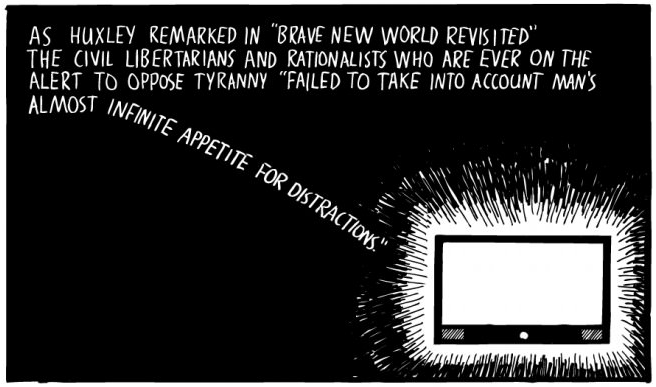
Yet if the only constant in this universe is change, opportunities for slowly turning the ship abound.
In Conclusion
In a 1926 column H.L. Mencken may have intimated that no one ever went broke
underestimating the intelligence of the populace, yet this fate is far from automatic and there remain numerous actions we can take to render the statement untrue going forward.
The world is complicated and simple binary answers are almost always far too simplistic and used to exploit rather than elucidate. Recognise this and spend the additional brain cycles interrogating the situation further — particularly when the consequences are important.
Almost thankless services like Snopes or FactCheck.org cannot be recommended enough. Even if engaging with a reputable fact-checking service before hitting that share button is a stretch too far, perhaps just Google the facts at hand and at least try make up your mind for yourself.
If you suspect you’re in an information bubble and want to find out what Google would return if it didn’t know you, try activating Incognito Mode when searching a topic of importance to you, to see what Google would ordinarily return if it wasn’t trying to tailor its results to your particular proclivities and history.
Also try out an alternative search engine like DuckDuckGo periodically if you’d like to see what a search engine doing zero tracking would return on a query.
Contrary to what (not-so) common sense would have you believe, critical thinking is not a faculty we are born with, in the same way we aren’t born with the ability to play the viola or write award-winning stage plays. It takes concerted effort not to allow System 1 to dictate everything and the more one learns about the brain, psychology and the cognitive biases which stalk us all — the better prepared one is with at least recognising times when one may be under a misapprehension and step back.
Recognise you may be inside a filter bubble and use some of the above to critically interrogate your assumptions. The next time you feel like reflexively calling someone a bigot/ignorant because they disagree with you — it might be an opportunity to try and build a bridge between two filter bubbles.
Communities of non-partisan critical thinkers can often be massively helpful. Ultimately it’s all about forming a growth mind-set, periodically testing your assumptions and being willing to change your mind if the data no longer supports your current view.
The world is not simple and the second law of thermodynamics gives us good reason to think it tends towards chaos without concerted effort (energy) to prevent that from happening. The Trumps, Zumas and Farages of the world offer that ever-attractive elixir, simplicity. They offer simple solutions to complex problems, exploiting everything we’ve outlined in this note at the level of Goebbels or McCarthy.
The world is complex and complicated, yet we have techniques and tools available to us today which our forebears could only dream of in order to tame and exploit this complexity. Distrust those who substitute simple problems for the complexity of the real problems which plague this world — think for yourself and save us all.
Bullshit Thinking About Thinking Harry Frankfurt
3315 Words
2019-06-13 19:43 (Last updated: 2019-07-09 20:22)
01f75cc @ 2019-07-09